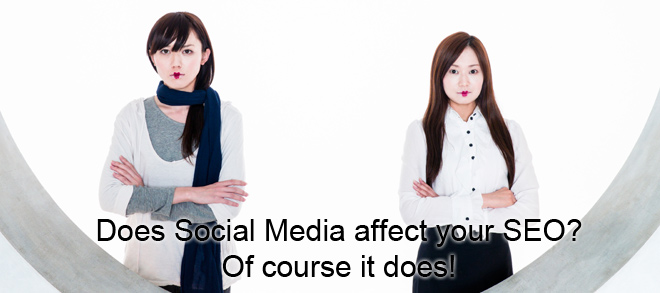
“SEO stopped being about simple keyword placement and backlinks a long time ago.”
Today, while keywords and links still matter (and they matter a lot) social media plays just as large a role in your page rank as any of the other “traditional” methods you might be using to appease the Gods of Google, Bing and Yahoo. Some say that social media plays into your ranking even more than keywords, links and tags.
It’s easy to understand why social media would suddenly play such a crucial role in how your site is ranked. Google+ was unveiled a couple of years ago and, so far, its adoption has been slow going.
Make no mistake, the people who use the system regularly love it but getting the word out and getting people into the habit of using it has been a harder than the heads at Google probably expected. By tweaking Google’s algorithms to favor social media mentions, likes, +1s, etc, Google is essentially forcing people to use social media to improve their page rankings.
Obviously, we’re speculating about the motivation but the outcome is the same: if you want to rank well, you need to be active on social media. More importantly, your followers and audience have to be active on social media. One tweet to your followers isn’t going to get the job done. And, it’s worth noting, that Google has made it very clear that Google+ engagement does factor heavily into the indexing process.
It sounds specious, we know, but there are loads of case studies that back this up.
Does Social Media Affect Seo? – Case Studies
A couple of years ago, Moz.com created a “Beginner’s Guide to SEO.” Smashing Magazine tweeted about it just once and bang! The guide (and Moz.com by extension) jumped to the top of Google’s rankings for the keyword “beginner’s guide”. (Source: QuickSprout.com, How social Signals Impact Search Engine Rankings)
EdUniverse decided to do a case study using its own blog and, via one blog post (and one update to that blog post) and some circulation of that blog post via social media, the site was able to raise its page ranking for a competitive keyword in just a little over a month and saw a huge increase in site traffic. (Source: EdUniverse.org, “How to Leverage Original Content: A Case Study About Content, Social Media, and SEO in Higher Ed”)
Putting This Information To Work
“Don’t jump onto social media and start flooding your feed with posts about your project just yet.”
The reason these companies and individuals have found such great success is that they knew what they were doing when they tested the social media waters. They put together smart campaigns. The content that they were promoting was high quality. If you want to replicate their success you can’t just start flooding the feed with promotional stuff.
For example, let’s check out the Matomy Media Group Twitter feed. This is a company that has had tremendous success using social media to improve its SEO (and the SEO rankings of its clients). When you look at the feed you can see that it is active, but that the feed isn’t just about Matomy. Sure, there are a lot of tweets about services they offer and retweets of others who have mentioned them. When you really look, though, you can see that the feed has just as much relevant and useful content about other companies and issues. It respects the Golden Ratio.
So many people make the mistake of treating Google+ like Facebook (which might be why adoption has been so slow going). On Google+, one of the best things you can do is take advantage of their Hangouts. Google Hangouts is sort of like a group chat but, like a live stream on YouTube, anybody can watch it. Unlike YouTube, though, you can have multiple active participants in multiple locations. They are great ways to host webinars, live shows, presentations, etc. Hangouts have proven incredibly effective for engagement and extending a company’s reach—which help raise a site’s rankings. (Source: Social Fish, “Easy B2B Tips for Google+ Users”).
Remember: Simply flooding your feeds is not going to raise your page rank.
“You have to get people talking about you to their own audiences.”
To do that, you have to learn how to use social media properly, because it does indeed affect your SEO!
In a lot of ways, Google’s focus shift from keywords and links to social media and contextual mentions is a blessing. It gives power back to the people who are working to build real things and takes it away from those who just like playing with the numbers because they want to sell ads. It’s made the Internet a better place for everyone. After all, aren’t your searches easier now? We know ours are!
[Image: iStockphoto, Mlenny]
Ravinder Sahu is SEO and Content Manager at Accunite Solutions who loves to write on latest trends in marketing, entrepreneurship and technology.
Comments are closed.